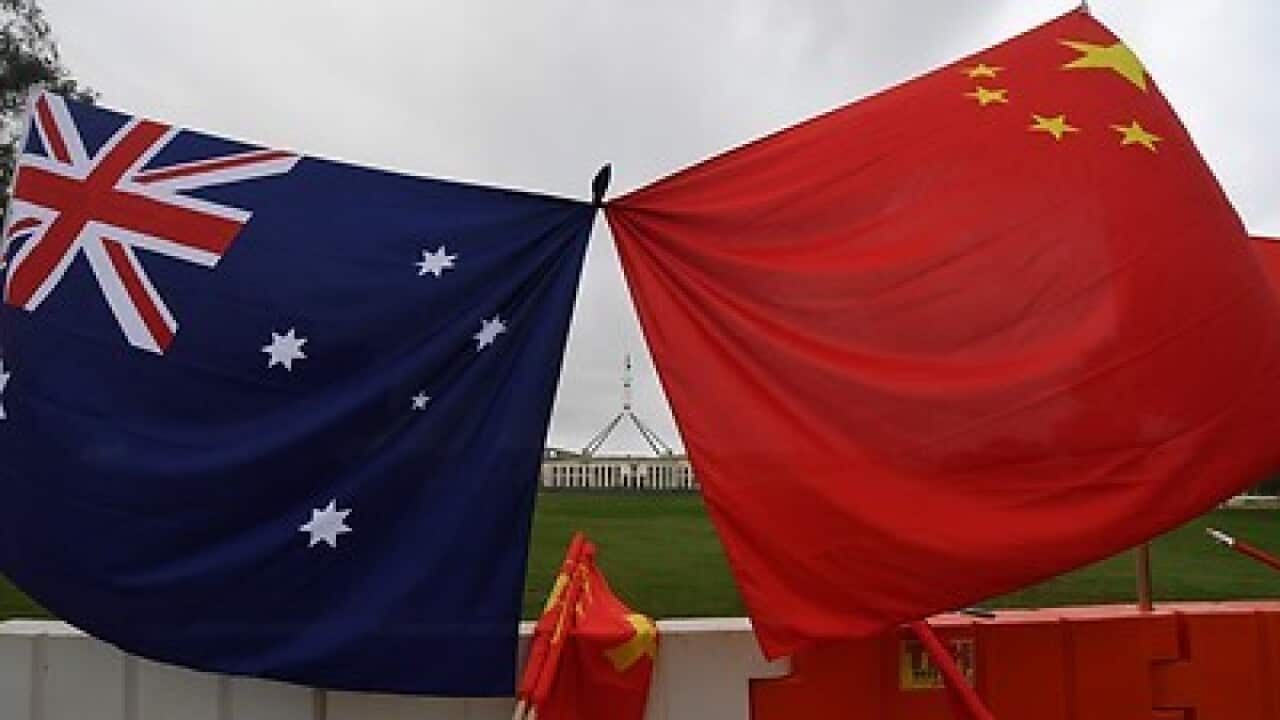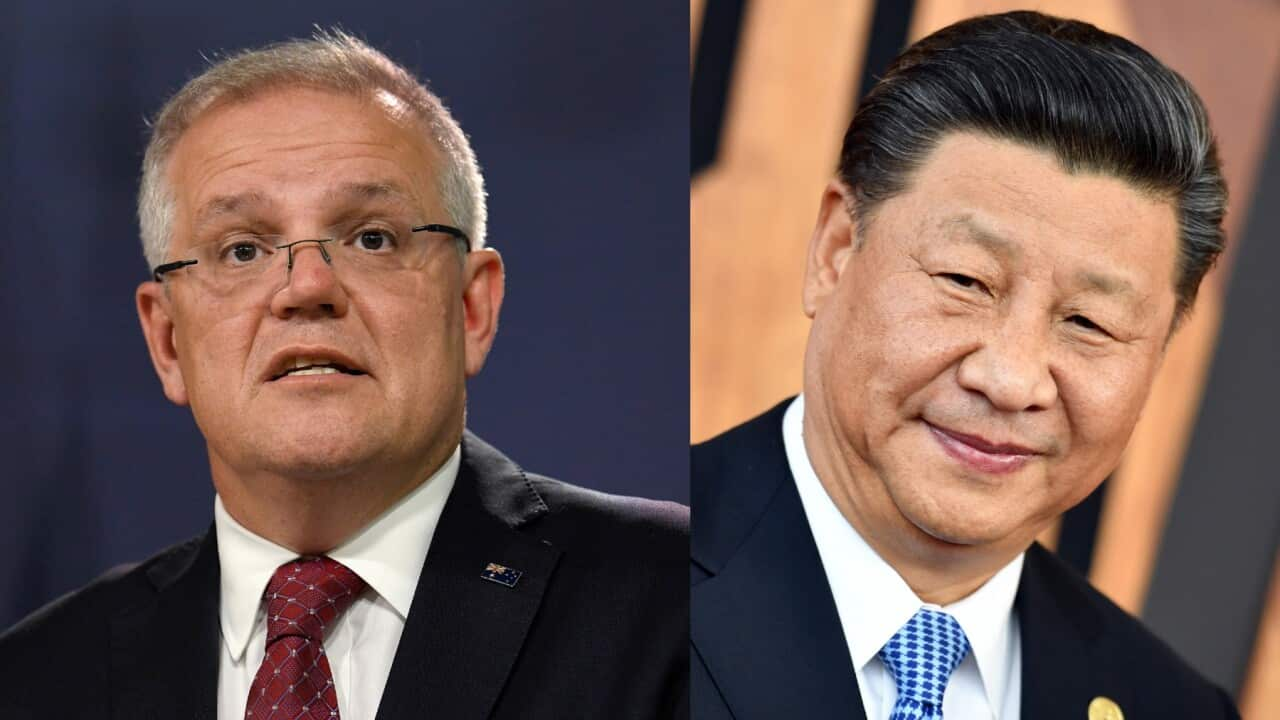Amid diplomatic tensions between Australia and China, there's speculation on how each side will respond next, including conjecture within the Chinese media that further trade tariffs from Beijing were imminent.
A reason why China will not completely cut off all ties with Australia is that it isn't that simple and there are many factors at play, experts say.
Reliance on Australia’s iron ore
The two nations are held together by strong trade bonds and a major reason for Australia’s V-shaped recovery from the pandemic is due to China’s high demand for iron ore.
Corporate adviser Raymond Chan believes, at least in the short term, China will remain Australia’s leading importer of the commodity.
“We must first understand how important iron ore is … [it’s] a raw material for steel, and steel is an indispensable material used in buildings, bridges and roads. Alternative markets such as Brazil may not be able to supply enough iron ore to meet demand,” says Mr Chan, Morgans Asia Head of Asian Desk - Retail.
China’s stimulus packages have seen the country’s demand for iron ore surge as part of its ramping up of steel-intensive infrastructure projects.  Various factors contributing to China’s decision-making work in Australia’s favour.
Various factors contributing to China’s decision-making work in Australia’s favour.

The iron ore price has surged due to China's steel demand. Source: AAP
Mr Chan says although Australia’s vaccination rollout is relatively slow, the virus has been well contained and production volumes of the commodity have not been affected.
“In terms of distance, Australia and China are quite close and the purity of Australia’s iron ore is relatively high,” he adds.
With China's reliance on Australia’s iron ore, the Chinese government has spoken about ramping up domestic iron ore production, as reported by state-run tabloid .
"Recently, there has also been news that the Chinese government is considering studying whether there is a monopoly or irregular trading in the iron ore market, which may further tighten regulations,” Mr Chan says.
The Belt and Road project
China watchers are growing increasingly pessimistic about the prospects of Australia-China relations, particularly after Beijing suspended all activities under the Australia-China Strategic Economic Dialogue on May 6.
Australia China Association in Canberra Honourary President Sam Wong believes the suspension was triggered by the federal government’s abolition of Victoria’s controversial infrastructure agreement with Beijing – the Belt and Road Initiative.  Mr Wong says this a clear sign of China recognising Australia’s “unfriendly attitude” towards it.
Mr Wong says this a clear sign of China recognising Australia’s “unfriendly attitude” towards it.

Foreign Minister Marise Payne tore up Victoria's Belt and Road agreements with China under foreign veto laws in April. Source: AAP
The Australian government has since downplayed the significance of its move, but Mr Wong says diplomats haven’t made "phone calls" to each other since 2017.
"The suspension of the Strategic Economic Dialogue, therefore, has no effect other than to mark China’s official response to the end of talks,” Mr Wong adds.
Following the ‘wrong’ leader
Professor Ding Xueliang, a Harvard-educated scholar, says the changes in relations between the US and China is another major reason for the deterioration of Australia-China ties.
Prof Ding says since 2018 every aspect of US-China relations has become tense and has morphed into a national security issue.
Past issues between the countries include the exchange rate of the Chinese yuan, the quality of Chinese export products and the revoking of Chinese student visas.
“Both sides have already lost basic strategic mutual trust ... This is a key reason for the deteriorating relationship between China and Australia.”
Mr Wong notes that Australia and the US have always remained tight-knit.  "Australia follows the United States [position]. I believe it will not change," says Mr Wong.
"Australia follows the United States [position]. I believe it will not change," says Mr Wong.

Australia has been accused of being “too closely engaged” with the US while “not engaged” enough with China. Source: AAP
“Looking back at history, the joint defence between the United States and Australia has not changed, including participation in the Second World War, the First World War, the Vietnam War, and the Middle East conflict. In terms of defence and diplomacy, even if Australia’s governing party changes there wouldn’t be a big impact."
‘Drums of war’
Professor Ding believes Australia is in a "very difficult" position.
The biggest factor affecting Australia-China relations is peace and stability in the Taiwan Strait, he says.
The Taiwan Strait is a key hotspot in the rivalry between the US and China.
Beijing claims the self-governing island as part of its own territory while the US supports Taiwan's independence and enjoys a range of economic, political and security benefits from their robust unofficial relationship.
The threat of war is ever-present, and Australia is at risk of being dragged into it as a result of its alliance with the US.
“In view of the serious situation in the Taiwan Strait, the extent Australia to which Australia intervenes and how it intervenes with trigger a ‘national security issue’ of the highest level,” Prof Ding says.  Last month, Australian politicians sent warnings of a confrontation with China, declaring the ‘drums of war’ are beating louder.
Last month, Australian politicians sent warnings of a confrontation with China, declaring the ‘drums of war’ are beating louder.

As tension continues building between China and Taiwan, Australia could be pulled into a conflict due to its US alliance. Source: AP
Home Affairs Secretary Mike Pezzullo said in a speech on Anzac Day that Australia will work hard to reduce the possibility of war, but “will not sacrifice our precious freedom”.
While Defence Minister Peter Dutton pointed out that “the possibility of conflict with China on the Taiwan issue should not be underestimated”.
Both comments were slammed by Labor, who accused the government of inciting a confrontation and indulging in political opportunism.
China’s foreign ministry spokesman, Zhao Lijian, also blasted the comments, which made front-page news as far away as London, in being described as “Cold War mentality”.
LISTEN TO

Military conflict over Taiwan - how and when?
SBS Polish
21/04/202109:31
Peacetime
Australia’s first ambassador to China Dr Stephen FitzGerald recalls how “things were pretty bad with China” when he was posted to the mainland in 1973.
There was no official relationship with Beijing until 1972 under Prime Minister Gough Whitlam’s leadership.
According to Dr FitzGerald, a fluent Mandarin speaker, diplomatic relations between the two countries were “fraught with difficulties” in the early days.
“Every step was a step forward in trying to broaden and deepen the relationship,” Dr FitzGerald told SBS Chinese in November.  Prof Ding also remembers rosier times between the two nations.
Prof Ding also remembers rosier times between the two nations.

An image from 1968 of Dr Stephen FitzGerald in China during the Cultural Revolution. Source: Stephen FitzGerald
During the 2008 Olympics, he and other researchers believed Australia and China had very few conflicting views.
Until now, China and Australia have no direct maritime or territorial disputes.
Prof Ding says he is saddened by the deterioration of Australia-China relations over the last few years.
“Most people are in disbelief,” he says.
Human rights and the rights to information
Mr Wong says in recent years the Australian government and mainstream media have held unfavourable views of China.
He says these organisations are behind Australian voters’ hardening attitude towards the Communist state.
“The MPs they elect cannot be pro-China. The elected MPs and the ruling government are all anti-China,” Mr Wong says.
A key case in point for Beijing came in April last year when .
Chinese Ambassador Cheng Jingye subsequently called on Chinese consumers to boycott Australian beef and wine, and to avoid travel to Australia for Chinese students then imposed the soaring tariffs on Australian goods.  Mr Wong says he wants China to better understand Australia.
Mr Wong says he wants China to better understand Australia.

China's Ambassador to Australia Cheng Jingye accuses Australia of inflicting economic damage on China. Source: AAP
"It's not that one side is right and the other is wrong, but that both sides must better understand each other to provide a clear direction for diplomacy and trade."
He also recognises the Australian system works differently; it has been committed to human rights over economic interests since Federation.
“Trade is not unimportant, but not the most important ... It (China) should understand Australia's attitude towards human rights,” Mr Wong says.
Other experts hold onto hope bilateral repair is on the cards.
“I’m really shocked and saddened by the deterioration of Australia-China relations,” says Prof Ding.
To read these stories in Chinese click here.

澳中战略经济对话机制断缆 铁矿石出口面临灭顶之灾
READ MORE

澳中关系缘何恶化?工党批莫里森为政治目的刻意煽动
